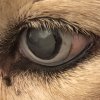M
mhassine
My dog Cassie (10 y old Husky mix) was diagnosed with a double cataract and the first vet ophthalmologist advises for a surgery. The argument is that her condition as a diabetic 1, hypothyroidic, and summer approaching with high UVs are no aggravating factors in the case of a surgery during the spring. I have doubts and now heading for a second opinion.
At the same time, I came across this site that promises to stop and possibly reverse cataracts. https://www.wisechoicemedicine.com/testimonials-dogs/
Do you have any views and/or recommendation?
At the same time, I came across this site that promises to stop and possibly reverse cataracts. https://www.wisechoicemedicine.com/testimonials-dogs/
Do you have any views and/or recommendation?


 .
.

